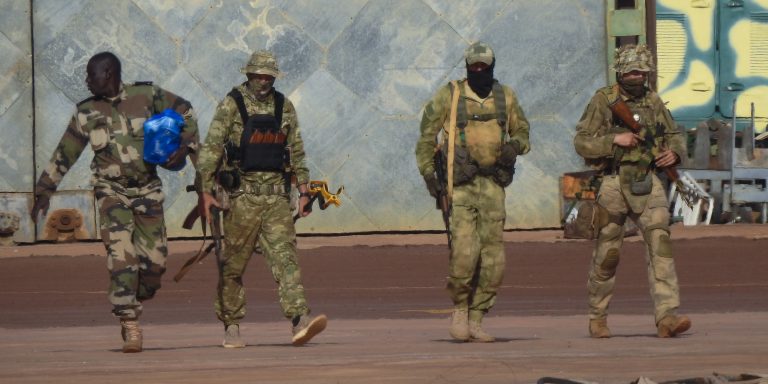INTELBRIEF
June 27, 2022
IntelBrief: Wagner Group Continues Wreaking Havoc Throughout Africa with Impunity

Bottom Line Up Front
- Members of the Russian private military company Wagner Group have been implicated in numerous criminal activities throughout both North and sub-Saharan Africa.
- While some believe Wagner activity in CAR is designed to offset sanctions on Moscow by accessing precious metals, others see the typical rapaciousness that comes with mercenary activity in fragile states.
- Wagner Group members have been accused of human rights abuses in many places, including in Mali and Libya, where Russia is attempting to expand its influence, working alongside militia fighters, warlords, and rebel groups.
- Without coordination between nations at bodies like the United Nations Security Council, it will be impossible to stabilize areas where jihadist terrorist groups linked to al-Qaeda and Islamic State are gaining strength.
Members of the Russian private military company Wagner Group have been implicated in numerous criminal activities throughout both North and sub-Saharan Africa. Over the course of the past year, a bevy of allegations suggests that Wagner Group mercenaries were involved in attacks on mines along the border of the Central African Republic (CAR) and Sudan. Approximately 1200 Wagner Group members are currently believed to be stationed in CAR, where Wagner has maintained a presence for the past four years. Many analysts are confident that its services were rendered in exchange for access to artisanal gold and diamond mines. Access to gold has become even more important to Russia since the onset of Moscow’s invasion of Ukraine in February. The Kremlin is attempting to weather aggressive sanctions and access to large quantities of gold and other precious metals would help soften the negative impacts.
Some simply see the rapaciousness that comes with mercenary activity in fragile states and ungoverned – or differently governed - spaces. Wagner mercenaries have been implicated in at least half a dozen attacks throughout CAR this year, including marauding-style attacks targeting migrant miner camps. During these attacks, miners have been beaten and murdered, while Russian mercenaries and CAR soldiers pillage and plunder the mines and surrounding area, with the goal of gaining complete control over the mines. These raids have included heavily armed mercenaries in armored vehicles and helicopters. At least one mass grave with more than twenty dead bodies was discovered, although estimates of the death toll vary. Wagner forces have been operating with impunity throughout CAR and there is no other entity on the ground capable of holding its mercenaries accountable.
With Russian forces bogged down and struggling to make progress against Ukrainian forces in eastern Ukraine, the Kremlin has continued to rely on Wagner to advance its political and economic interests abroad. But some Western intelligence assessments suggest that Russia could soon deplete its combat capabilities in Ukraine, which presents a tension for Moscow. Bringing Wagner forces back to fight in Ukraine weakens Russia’s position in the Middle East and Africa, where Russian President Vladimir Putin has made a concerted effort to solidify Moscow's influence over the past five to ten years. Wagner members have been accused of human rights abuses in many cases, including in Mali and Libya, where Russia is operating alongside militia fighters, warlords, and rebel groups. In Mali, Wagner forces are reportedly responsible for killing hundreds of civilians near the town of Moura but have nonetheless been invited by the Malian government to remain as French counterterrorism forces are leaving the region. Yevgeny Prigozhin, believed to be one of the chief financiers of Wagner, refuses to even acknowledge that Wagner exists, a common tactic used by high-ranking Russian officials and figures.
With the mandate of the United Nations Multidimensional Integrated Stabilization Mission in Mali, known as MINUSMA, up for renewal, there have been contentious debates at the UN Security Council, focusing in part on the presence of Wagner mercenaries but also on what future role French military forces might play, if any. MINUSMA consists of approximately 12,000 troops, in addition to police personnel and other security forces. The Sahel has grown increasingly unstable in recent years, with terrorist affiliates of both the Islamic State and al-Qaeda active throughout the region. Mali has struggled with a series of coups, leading to further turmoil and uncertainty. Anti-French demonstrations have increased in Mali, which many believe to be stoked by a Kremlin-backed disinformation apparatus. In an era of great power competition, many countries in Africa will be caught in the crosshairs of struggles between the United States, Russia, China, and others. UN missions and personnel – and the civilians they are intended to protect – will be left more vulnerable to terrorist attacks. But without coordination at bodies like the UNSC, it will be impossible to stabilize areas where jihadist terrorists are gaining strength, further destabilizing entire countries and regions. A clearer determination of if and how UN forces in such contexts manage the terrorist risk in order to protect civilians, support peace processes and work with regional and local partners is going to be critical in the near to medium term.